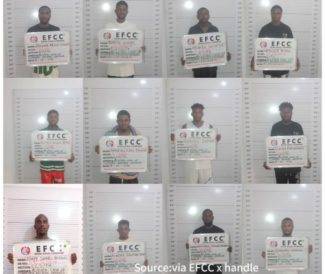The Benin Zonal Command of the Economic and Financial Crimes Commission (EFCC) has achieved a significant milestone in its fight against cybercrime. Between Friday, March 22, 2024, and Tuesday, March 26, 2024, the EFCC secured the conviction and sentencing of 26 individuals involved in internet fraud. The verdict was delivered by Justices Efe Ikponmwonba and M. Itsueli of the Edo State High Court sitting in Benin City.
Convictions and Sentences
The convicted fraudsters, comprising a diverse group of individuals, were found guilty of various charges related to online scams. Among them are Balogun Oladipupo, Ehigiamusoe Desmond, Jeffery Enogieru, and others, who pleaded guilty to one-count separate charges bordering on obtaining by false pretense and possession of fraudulent documents. Prosecution counsel, F. A. Jirbo, among others, urged the court to convict and sentence them accordingly.
Judicial Decisions and Forfeitures
While the defense counsel pleaded for leniency, emphasizing the remorsefulness of the defendants, the judges handed down sentences reflecting the gravity of their offenses. The sentences ranged from two to three years imprisonment or substantial fines. Additionally, the judges ordered the forfeiture of assets, including phones, laptops, vehicles, and bank account balances, to the Federal Government of Nigeria. Notably, one convict, Abdullahi Rahman, was directed to refund N480,000 to his victim. Furthermore, all convicts were mandated to commit to good behavior in writing.
Arrest and Investigation by EFCC
The journey to conviction began with the diligent work of EFCC operatives, who acted on actionable intelligence regarding the involvement of these individuals in internet-related fraud. Their arrest underscores the commitment of the EFCC to combat cybercrime and bring perpetrators to justice. This successful prosecution sends a strong message to would-be fraudsters and reaffirms the EFCC’s resolve to safeguard the integrity of Nigeria’s financial system and protect citizens from online scams.
This comprehensive crackdown on internet fraud not only highlights the EFCC’s effectiveness in tackling cybercrime but also serves as a deterrent to others engaged in similar illicit activities. The collaboration between law enforcement agencies and the judiciary underscores the collective effort to uphold the rule of law and preserve the integrity of Nigeria’s digital landscape. As the battle against cybercrime continues, the EFCC remains steadfast in its mission to ensure a safer and more secure online environment for all citizens.
Alarming Surge in Cybercrime Among Nigerian Youth Threatens Nation’s Future
In recent years, Nigeria has witnessed a concerning surge in cybercrime activities among its youth, signaling a threat to the nation’s future. The proliferation of cybercriminal activities, ranging from internet fraud to identity theft, has reached alarming levels, prompting widespread concern among stakeholders. This trend not only tarnishes Nigeria’s global reputation but also undermines its economic and social development prospects.
The implications of rampant cybercrime among Nigerian youth are profound and multifaceted. Firstly, it erodes trust in the country’s digital economy, deterring foreign investment and hindering economic growth. Secondly, it perpetuates a culture of lawlessness and impunity, as many young individuals engage in cybercriminal activities with little fear of consequences. Moreover, the involvement of youth in cybercrime jeopardizes their future prospects, as criminal records and reputational damage can impede their educational and employment opportunities.
Government and Stakeholders Rally to Combat Cybercrime Epidemic
Recognizing the severity of the situation, the Nigerian government, in collaboration with relevant stakeholders, has initiated urgent efforts to devise strategies to combat the scourge of cybercrime among the youth. One key aspect of this approach is the establishment of a collaborative environment involving both parents and government agencies. Parents are being encouraged to educate their children about the ethical use of the internet and the legal consequences of engaging in cybercriminal activities.
Simultaneously, law enforcement agencies, such as the Economic and Financial Crimes Commission (EFCC), are being strengthened and adequately empowered to effectively address the menace of cybercrime among youths, particularly among Nigerian students. This entails providing the EFCC with the necessary financial resources, technological tools, and training to investigate and prosecute cybercriminals effectively. Additionally, there is a growing emphasis on enhancing cybersecurity measures and promoting digital literacy programs to empower young Nigerians with the knowledge and skills to navigate the online world safely and responsibly.
As Nigeria grapples with the escalating challenge of cybercrime among its youth, concerted efforts from all sectors of society are imperative to safeguard the nation’s future and ensure a secure and prosperous digital landscape for generations to come.
Table of Contents
Discover more from OGM News NG
Subscribe to get the latest posts sent to your email.














